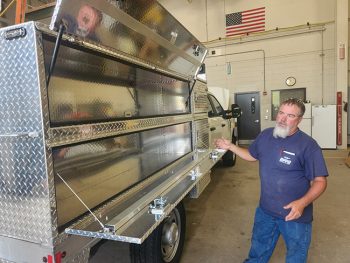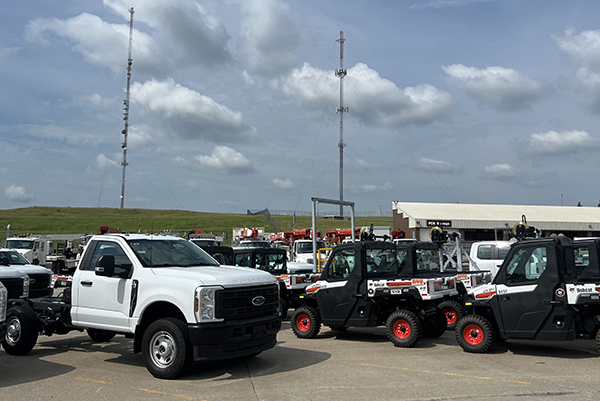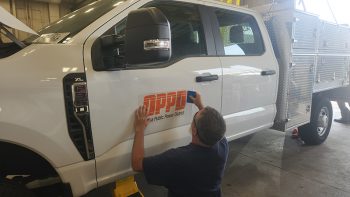Fleet technicians help prepare OPPD vehicles for duty

Before they roll out to help restore power, build infrastructure and generate electricity for thousands of Nebraskans, every new OPPD vehicle arrives at a transportation garage in Elkhorn.
Inside an OPPD service center, a fleet specialist and fleet technicians add all the specialized, non-factory features that allow field and plant workers to do their jobs: shelving, lights, power outlets, inverters, metal or fiberglass truck beds, hooks for hanging tools and, of course, OPPD’s famous orange door decals.
“We’re always asking if there’s something different we want to do to make fleet vehicles more effective and efficient,” said Transportation Fleet Support Specialist Nick Bessey.
Fleet technicians prepare, repair and maintain every vehicle in OPPD’s arsenal, from the trucks that service eastern Nebraska to the skid loaders, boring rigs, bulldozers and coal-hauling locomotives that keep power flowing.
Every upgrade fortifies vehicles for the tough conditions they’ll face throughout OPPD’s 5,000-square-mile service territory.
Custom builds
All OPPD vehicles follow a customized maintenance schedule to keep them running as smoothly as possible.
OPPD buys fleet vehicles from local dealerships as much as possible but will shop outside of the local area when necessary. Bessey said the department makes every effort to order what workers need and adjusts as necessary to match changes in their operations. Technicians sometimes custom build truck racks from scratch.
“There’s always steps involved,” said OPPD Fleet Technician Steve Duff. “It’s like putting a puzzle together. There’s always construction, always things going on.”
Some crews need arrow boards or spotlights or ladders, or extra racks to hold gear. The fleet team accommodates those needs as much as possible while keeping in mind OPPD’s financial obligations and the necessity to standardize for others who may use those vehicles in the future.
“There could be any number of things needed, and all of that is going to be beyond the very basic fiberglass shell with a few shelves that we get from the manufacturer,” Bessey said.
Maintaining the fleet
As demand for reliable electricity grows, OPPD is replacing dozens of fleet units (cars, trucks, trailers, equipment and attachments) just to maintain the current fleet over the next few years. At the same time, OPPD is adding more vehicles to accommodate additional workers, locations and capabilities to serve customers. Upgrading a new truck to OPPD’s needs can take two to three weeks, depending on circumstances.

“We’re creating a tool, and it’s massively important for their efficiency and capability,” said Kurt Hartman, field supervisor for Transportation and Construction Equipment.
OPPD learns about industry vehicle trends from new hires, vendors, industry trade groups, other utilities and trade shows. Bessey talks regularly with manufacturers about recent design changes. Sometimes, OPPD will rent or test drive a model to see how it functions in the field.
“We put vehicles through the works to make sure they do what we need them to do,” Bessey said.
Prepping for mutual aid
When another utility calls for mutual aid assistance after a major storm, OPPD’s fleet personnel jump into action quickly. Every truck assigned to the call gets inspected and prepared for a long journey, sometimes thousands of miles. For every mutual aid trip, OPPD also sends at least two fleet technicians in support roles.
“We have to scramble, because when someone requests mutual aid, we’re usually leaving within 24 hours,” Hartman said. “We’ve got to get eyes on every one of those vehicles.”
Fleet technicians who join the mutual aid calls work the same 16-hour shifts as line crews, repairing vehicles and other equipment as needed. They also run errands so line technicians can focus on restoration work.
“As with everything else, you have to use safety conscious, creative thinking,” Hartman said.
‘An engineering mind’
The fleet technicians who prepare trucks build expertise in a variety of crafts. They weld, fix hydraulics, fabricate parts, operate lathes, change oil and perform hundreds of other specialized tasks.
OPPD fleet technicians must complete a four-year transportation apprenticeship before they become full-fledged journeymen in their trade. The journeyman exam includes extensive oral and written tests.

“We have some people come to us who specialize in cars and light trucks,” Hartman said. “We have others who worked at a big, over-the-road truck shop. And we have people who worked on earth-moving and construction equipment. These are all needed, because we have such a wide variety of equipment.”
Hartman said OPPD generally seeks fleet technicians with at least a few years of hands-on, real-world experience beyond trade school.
“Our goal is to have people that are ready to go into the apprenticeships and be successful,” he said.
Road to OPPD
For Duff, the road to OPPD began at Iowa Western Community College, where he studied automotive technology. He worked in part shops before joining OPPD part time, then eventually full time, and earned his promotion to journey level in December 2010. In his free time, he used to build monster trucks and rock crawlers, but now he works on boats, including one that can travel up to 100 mph.
“You just have to have that mindset where you love to work with your hands and learn how things work,” he said. “You’ve got to have a little bit of an engineering mind and figure how to make things go together.”
The job requires a technical mind, adaptability, teamwork and creative problem solving. Good communication is paramount, along with a strong understanding of how OPPD field workers operate.
“That’s what I think everybody in this department loves,” Hartman said. “It’s never the same thing every day. There’s always something new, something different, always a challenge. You don’t get complacent because it’s not possible.”

Grant Schulte joined OPPD as a content generalist in 2022. He is a former reporter for The Associated Press, where he covered the Nebraska Legislature, state politics and other news for a global audience. He is a graduate of the University of Iowa and a proud Hawkeye. In his free time he enjoys running, reading, spending time with his wife, and all things aviation.
View all posts by Grant Schulte >


